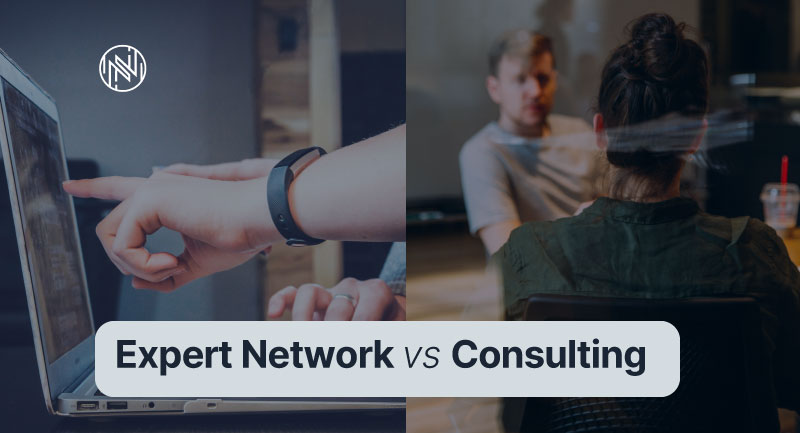
Expert networks and consulting firms offer specific business knowledge, yet they differ significantly in terms of engagement models, pricing, timeframes, and deliverables. Expert networks provide on-demand, specialized advice to industry experts, whereas consulting companies provide long-term, strategic assistance that can be implemented.
What Are Expert Networks?
Expert networks have been used to describe networks between businesses and industry experts with niche and deep knowledge in certain areas. These sources have large repositories of professionals, from former Fortune 500 executives to technical professionals in the fields of healthcare, technology, finance, and manufacturing.
The model works on a consultancy basis where firms get individual expert consultation at a fee usually for 30-60 minutes. Organizations can obtain accurate information without long-term contracts; hence, this strategy is especially useful in decisions that need to be made in a short period.
What Is Traditional Consulting?
Traditional consulting entails the contracting of a consulting firm to diagnose issues, plan, and, in most cases, assist in implementation. The consulting firms tend to send a team of consultants to work on a project that may take weeks or months. In such teams, research and analysis are done in great depth, and reports are made with recommendations. In most instances, consultants are also useful in the implementation of the proposed solutions.
Consulting firms are full-service providers. They gain ownership of projects, starting with preliminary assessments and extending to eventual recommendations (and even implementation). Such a holistic nature implies that consultants will explore internal data, conduct competitor and market analyses, and develop business-specific strategic plans.
The result is usually an extensive deliverable, such as a slide deck or a written report, along with practical assistance in implementing the plan. The trade-off here is that such a process is more time-consuming and expensive than a quick call to an expert.
Aspect Comparison
| Aspect | Expert Network | Consulting |
| Engagement Model | On-demand, one-off expert consultations as needed. No long-term contracts; you tap specific expertise for point-in-time questions. | Long-term projects with a dedicated consulting team working closely with your organization. Engagements can last from weeks to years. |
| Scope of Insight | Narrow and targeted – focused on specific questions or niche topics. Ideal for getting quick answers or niche expertise. | Broad and holistic – addresses multi-faceted challenges across departments. Can involve strategy, operations, market research, implementation, etc. |
| Deliverables | Informal knowledge transfer. You gain insights via a dialogue with an expert. Little to no formal documentation is provided from the call (you take your own notes). | Structured deliverables. You receive detailed reports, frameworks, slide decks, and actionable plans. Consultants often present findings to stakeholders. |
| Cost Structure | Pay-per-use model (fee per hour or per consultation). Cost-effective for short inquiries; you pay only for the expert’s time. No hefty retainers or minimum fees. | Project-based fees (often tens of thousands of dollars or more). Covers the work of an entire team and firm overhead. Expensive, but includes comprehensive analysis and support. |
| Speed & Agility | Very fast deployment. Experts can often be scheduled within days or even hours, providing rapid insights for urgent questions. | Slower pace. Onboarding a consulting team and conducting analysis takes time. Projects often have multi-week or multi-month timelines before recommendations are delivered. |
| Team Involvement | Single expert perspective. You speak directly to a subject-matter expert with firsthand experience. (No support team or multi-skill collaboration in a single call.) | Consultant team input. A group of consultants (possibly with varied expertise) collaborates on your project, bringing a mix of skill sets and performing cross-functional analysis. |
| Implementation Support | Not included. After the expert call, it’s up to your team to act on the advice. Expert networks typically do not execute changes for you. | Included. Consultants often assist in implementing their recommendations, working alongside your team to ensure changes are made and goals are met. |
Expert networks provide quick, improvised, and focused knowledge from highly experienced individuals, whereas consulting companies offer holistic, end-to-end solutions through formal analysis. One will present a brief dialogue to prompt a decision, while the other will show a well-organized project to resolve a complex issue.
Key Differences at a Glance
Scope of Engagement
Expert networks are used for point-in-time knowledge transfer. You draw on specific expertise for on-the-spot queries.
Cost Structure
Expert network consulting is a fee-based business model that charges based on the number of hours or per consultation. You only pay for the time spent with experts.
Timeline
Expert networks provide fast deployment. Schedule calls in a matter of days, sometimes hours.
Deliverables
Expert networks are a source of dialogic information. You acquire knowledge through direct dialogue, but usually don’t receive any formal documentation of it.
When to Choose Expert Networks
Quick Market Validation
Professionals in venture capital due diligence have an advantage over consulting firms in terms of an expert network. Expert networks are the most suitable when investment theses or assumptions on the market need to be validated quickly.
Expert Technical Knowledge
New ventures that are experimenting with new technologies or new regulations can value specific expert discussions. Instead of spending months on hiring consultants, it is better to establish contact with people knowledgeable in certain technical issues.
Budget Constraints
Traditional consulting might be prohibitive to small and mid-sized firms with tight budgets. Expert network consultations enable you to access only the expertise required, without incurring the high costs associated with traditional consulting services.
When to Choose Traditional Consulting
Strategic Planning at the Grassroots
Consulting depth is present in firms that need full-scale transformation or market entry policies. Consultants invest in getting to know your business as a whole and creating unique frameworks.
Implementation Support
Consulting firms offer practical help when strategy is of secondary importance to execution. They collaborate with your teams in order to make action out of recommendations.
Long-term Complex Projects
When the issues involved are multi-faceted and cut across departments or geographies, the engagement should be maintained. Consulting teams consult at levels to make a change that is systemic.
Making the Right Choice for Your Business
If you are looking for immediate, targeted information for immediate decisions, expert network consulting is an efficient solution. Nexus Expert Research makes this process streamlined with quality-assured specialists.
Choose traditional consulting when addressing complex organizational issues calling for long-term focus and implementation assistance. Consider hybrid approaches that let expert communities give feedback to consulting interventions or serve as a source of confidence in consultant recommendations.
| Business Need | Best Fit | Why? |
| Rapid market insight | Expert Networks | Quick access to targeted, actionable expertise |
| In-depth strategy & transformation | Consulting Firms | Comprehensive analysis, multi-phase long-term solutions |
| Budget constraints | Expert Networks | Flexible, pay-as-you-go pricing; no large upfront cost |
| Implementation support | Consulting Firms | Teams drive change, manage projects, track execution |
| Technical or regulatory challenges | Expert Networks | Access to niche specialists for precise answers |
| Complex, multifaceted problems | Consulting Firms | Strategic frameworks, cross-functional support |
Clarify Your Need
A call with an expert could be enough to answer a very particular question or to have a sanity check on an idea. In case you are faced with a wide and intricate issue that reaches a lot of parts of your business, then a consulting project might be the right option.
Match the Solution to the Problem
Expert network consulting is the most efficient solution in certain cases, especially when the targeted insight is required immediately. For example, when you need fast feedback on a decision, say, you need information on an industry insider or fact point to make a decision tomorrow, an expert network will provide you with those results.
Consider a Hybrid Approach
The smarter companies employ both in most cases. The first one could be working with an expert network to test assumptions quickly and get ground-level feedback in the preliminary research stages. Once you have those preliminary expert contributions, then take a consulting firm and create an entire strategy and help to implement it.
Taking the Next Step: Future Building
Applying expert network vs consulting differences results in better resource allocation. No one answer is better than the other; it depends on the context.
First of all, you need to clarify your questions. If answers need specific expertise (not full strategy development), then expert networks have attractive benefits. For transformation initiatives that require a sustained partnership, traditional consulting offers the needed depth.
Ready to access specialized expertise quickly? Explore how Nexus expert networks can accelerate your decision-making process today.
Frequently Asked Questions
1. What price tag does expert network consulting really lead to?
Expert networks charge approximately $200-$800/hour for consultation, but there is no minimum commitment. Traditional consulting costs over $50,000 per project. Pay for exactly the expertise you need, when you need it.
2. Does combining expert networks with consulting make sense?
Yes, and it’s smart. Rapidly validate the market and get insight from the ground level using expert networks during research phases. Then consult with consultants for the full strategy development.
3. What knowledge can I really get from the experts?
From former Fortune 500 executives to technical specialists in niches as diverse as healthcare, technology, finance, manufacturing, and more. Expert networks get you connected to professionals who have done just that.
4. Is consultation advice on par with consultation reports?
The purpose of different values is not the same. Experts provide you with real, battle-proven knowledge from people who faced the same issues. Experts give formal analysis and models.








